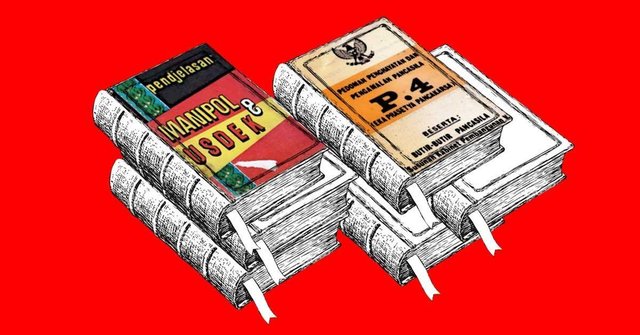On behalf of State Ideology

Book on Manipol-USDEK and Upgrading Material P-4, Source
Pancasila Ideology Development Board (BPIP) decorate the news portal page of last week. The institution under the President was formed in May 2017. It became the working unit that assisted President Joko Widodo in formulating the policy direction of Pancasila ideology development. A number of community and intellectual leaders are incorporated in it.
Spotlight leads when the amount of salary received by the BPIP team is exposed to the public. Some circulate, the amount allocated too big even higher than the president and ranks of other high officials of the state. The latest development came from the chief executive of BPIP, Yudi Latif who decided to resign. Various questions are also increasingly rolling on the urgency and performance of BPIP.
Given its history, ideological institutions such as BPIP have existed in two regimes. In the era of Sukarno was known indoctrination Manipol-USDEK. Meanwhile, during the New Order era, the Guidance of Practice and the Application of Pancasila (P-4) was once deeply rooted in the life of the community. How is the second one in guarding the state ideology?
Indoktrinasi Ala Sukarno
Beginning when Bung Karno issued the Presidential Decree on 5 July 1959 which became the milestone of Guided Democracy. The state ideology was redefined. "He (Sukarno) called for the revival of the spirit of revolution, social justice, and the re-equipment of state institutions and organizations for the sustained revolution," says historian Merle Calvin Ricklefs in Modern Indonesian History.
Sukarno describes the state ideology in the Political Manifestation (Manipol). The Manipol is the content of Sukarno's speech entitled "Rediscovery of Our Revolution" on the anniversary of the independence day of 17 August 1959. The Manipol essence consists of five elements called USDEK, the 1945 Constitution, Indonesian Socialism, Guided Democracy, Guided Economy and the Indonesian Personality.
"Efforts Sukarno made Manipol USDEK as official interpretation marks a significant change Pancasila became the 'ideology of the state' that is official and single," writes Roy B.B. Janis in Soeharto's Disciple Soekarno. "All the power of society is mobilized only to recognize and 'practice' the official notion while rejecting any notion that is inconsistent with it."
Once established in the National Guidelines (GBHN), the USDEK Manipol doctrine is introduced to all walks of life. It is the institution of the Supreme Advisory Council (DPA) which acts as a tool of indoctrination. DPA consists of 45 people from various groups in charge of providing input for the President. But in its performance, DPA is more functioning as a container think thank pengengawatahan Manipol-USDEK.
Manipol USDEK becomes material inserted through elementary school curriculum up to university. Indoctrination also includes civil servants and employees of state enterprises. Leading Indonesianist. Herberth Feith in Sukarno-Military in Guided Democracy says every political party, mass organization, and press are required to support and accept Manipol-USDEK as its guidance. In practice, this indoctrination is not enough as an ideological coach. It is also a political tool that cuts through the hegemony of power.
"Some pro-Masjumi and pro-PSI editors refuse to do so, and their newspapers are banned," Ricklefs wrote.
Soeharto's strategy
The politicization of ideology was repeated in the New Order era. In 1975, President Soeharto proclaimed Eka Prasetya Panca Karsa or Guidance on the Evangelization and Practice of Pancasila. This idea was ratified by the MPR in the Special Session with MPR Decree No II / MPR / 1978.
"Gradually formed the materials I assigned to think of the materials of upgrading, giving direction and carrying out the upgrading, both at the national level and at the regional level," Soeharto said in Soeharto's autobiography: Thoughts, Speeches, My Actions.
To guard the course of this ideology program, Soeharto established a special institution: Penlat Development Team and Upgrading of Employees of the Republic of Indonesia and the Board of Education for the Implementation of P-7 (BP-7). The upgrading program is intended for all citizens, especially civil servants and ABRI officers. In P-4, the Pancasila practice form is detailed in 36 points.
All government employees and military personnel are required to take part in the upgrading. At the beginning of each new year of junior high school, high school, and university both public and private participated in organizing P-4. It can not be denied that the implementation of P-4 upgrading drew huge cost
According to Galih Hutama Putra, P-4 policy is the implementation of the New Order government's goal to run Pancasila purely, consistently, and consequently. But this policy did not escape from the harvest of criticism. The reason, P-4 leads to the establishment of Pancasila as a single principle which then lead to political chaos. Some people consider this policy to impose ideology from the government as well as Suharto's strategy to strengthen his power. Those who refused included, among others, the Petisi 50 and the religious groups represented by the United Development Party (PPP).
"The P-4 and the Single Policy are an attempt by Suharto to strengthen his power," Galih writes in his thesis at the University of Indonesia entitled "Guidance on the Practice and Applying of Pancasila (P-4) and the Sole Principle: Soeharto's 1978-1985". "Although in practice it has been heavily criticized and reacted strongly by various societies, but Suharto managed to overcome it and keep it running for almost 20 years."
Both the ideological institutions of the Old Order and the New Order were disbanded along with the fall of the regime's power. The USDEK manipol indoctrination stalled after the outburst of the 1965 political strife that ended Sukarno's rule. Even so, the upgrading of P4 suffered the same fate. In the November 1998 Special Session, the MPR revoked MPR Decree No. II / MPR / 1978 on P-4. Consideration, the content and implementation of P4 is inconsistent with the development of state life.
from state funds and was prone to be a budget manipulation project.